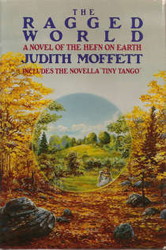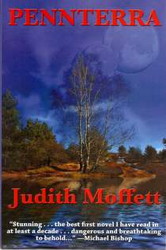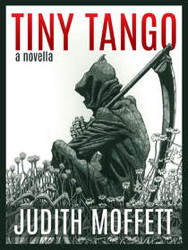
Welcome to the first Monday of August, or as I suspect I’ll be thinking of it, Revision Month. That’s right, the editorial letter for my forthcoming novel arrived recently. I’ve gone through the notes, produced notes of my own, and just two days ago sat down with my editor for a two hour meeting to make sure we were both on the same page (so to speak). My main writing goal for the next few weeks is to implement the changes, additions, deletions, and assorted line edits in the manuscript. Sounds like great fun, right?
Meanwhile though, it’s Monday, and this week that means we are graced with the presence of Judith Moffett, author, poet, academician, and translator, and she’s won awards, prizes, and grants scattered across all four areas of expertise. Limiting our focus to her prose fiction works, I can tell you that she won the first ever Theodore Sturgeon Award for her short story “Surviving,” and dis so in the same year that her first novel, Pennterra, came out. The following year, Judith took home the John W. Campbell Award for Best New Writer. She’s since followed these with other short stories, novellae, and novels, including her Holy Ground trilogy (The Ragged World, published in 1991, followed by Time, Like an Ever-Rolling Stream in 1992, and concluding with The Bird Shaman, published in 2008).
Utterly unbeknownst to me, she’d been living in the greater Philadelphia area for decades. Alas, she recently moved out of state, making it considerably harder to camp out on her doorstep in the hope that some of her talent will rub off on me. Instead, I’ll have to settle for her musings on her most memorable meal.

LMS: Welcome, Judith. It’s always a special treat to have a Campbell winner here. Care to talk about your most memorable meal?
JM: My most memorable meal was prepared and eaten more than fifty years ago—that’s how memorable it was.
While in college I had a summer job as Nature Specialist at the Dayton OH area Girl Scout camp, called Whip-Poor-Will Hills. This was in 1962. When the season was over and the campers had all gone home, counselors and staff stayed a couple of extra days to clean the place up and put the camp to bed for the winter.
On our last evening together we threw a special celebratory cookout, a traditional final event of one more successful season. I worked at other Scout camps later on, but none with a food budget nearly as generous as the one at Whip-Poor-Will. I’m not sure how they did it. We’d been eating pretty well all summer, but for this special meal the kitchen and the camp director pulled out all the stops.
We had all been working together for two months at this point and our teamwork had become automatic. We split without discussion into several patrols and just got down to it—looked around to see what needed doing and pitched in; the counselors and waterfront and nature staff all knew how to go about doing everything. The prep started with the digging of a pit in the center of one of the fire circles. While some were digging, others were dragging big deadfall branches out of the woods, or trimming and chopping them into useful lengths with a hatchet, or fetching buckets of water for washing and to douse flying sparks. Pretty soon an impressively big fire was roaring away in the pit. While this burned down, which took several hours—hefty chunks of wood had been added once it was going well, to produce coals that would stay hot a long time—a few of us were cutting green logs into foot-long sections and splitting the sections in half. Others were wrapping baking potatoes in foil and nailing—yes, nailing—large red steaks to the split sides of the log sections.
When the fire had burned down to a deep bed of beautiful red coals, somebody wearing a long oven mitt raked the topmost coals aside, placed the foil-wrapped potatoes in a single layer in the pit, and buried the silver lumps by pulling coals back on top—carefully, so as not to tear the foil—and heaping them high. The last step, a while later, was to arrange the split log sections with the crucified steaks in a circle close around the coals, steaks facing the heat. Because the logs were green, they would get a little scorched but not catch fire.
In the background of this more dramatic business of getting the potatoes and plank steaks ready, several huge bowls of salad were being assembled in the kitchen, and people were chopping green onions and frying bacon to crumble on top of the sour cream the potatoes would soon be slathered in. This is making me salivate as I describe it.
What we drank wasn’t memorable—lemonade or soft drinks, no doubt; no booze allowed at Scout camps. I don’t think anybody cared one bit.
And finally the culmination of all this fuss: twenty or so women—college kids, kitchen staff, middle-aged administrators—who had worked together all summer to give a lot of little girls a good time, standing in a circle around the fire pit in the gathering dusk. In their hands, big Melmac plates; on each plate a huge steak running with juice, a baked potato piled colorfully with sour cream and trimmings, and a bright crisp heap of dressed salad. I’m sure we “sang graceâ€â€”“Johnny Appleseed†or a three-part round like “Alleluliaâ€â€”before hunkering down on the fire circle’s log ring and digging in.
After dinner, a practiced clean-up involving three laundry tubs—soap, rinse, disinfectant—and a team wielding dish towels. Anyone not working tubs or towels was taking turns cranking the ice-cream maker. It was dark by the time we’d finished cleaning up, and by then the ice cream was ready to be served up in Melmac bowls. When that was all gone and the bowls and spoons dispatched with, people threw handfuls of kindling on the coals to make them blaze up, and we sang camp songs for probably another hour, accompanied by guitars, before the director signaled for the inevitable last three songs: “Jacob’s Ladder,†“Peace I Ask of Thee, O River,†and “Taps.â€
That was one great meal, but what was memorable about it had everything to do with lots of elements other than the meal itself—maybe that’s always true. Our circumstances, the wooded setting, the teamwork, the essential skills of primitive outdoor cookery (no briquettes, no gas grill, one match, no paper), the campfire, the singing, and the pleasure of closing down a successful summer after much hard work and satisfaction, set a frame around that meal that has fixed it permanently in memory.

Thanks, Judith. I think that’s the oldest memorable meal anyone’s served up for us here at EATING AUTHORS. A new record!
Next Monday: Another author and another meal!
#SFWApro
Tags: Eating Authors



